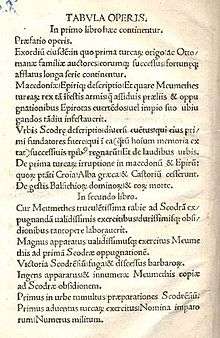Marin Barleti
| Marin Barleti Marinus Barletius | |
|---|---|
| Born |
c. 1450-1460 Scutari, Republic of Venice (modern Shkodër, Albania) |
| Died |
c. 1512/1513 (age 52–63) Padua, Republic of Venice (modern Padua, Italy) |
| Known for | Author of Historia de vita et gestis Scanderbegi Epirotarum principis |
| Scientific career | |
| Institutions | Church of St. Stephan |
Marin Barleti (Latin: Marinus Barletius, Italian: Marino Barlezio; c. 1450–60 – c. 1512–13) was a historian and Catholic priest from Shkodra.[1] He is considered the first Albanian historian because of his 1504 eyewitness account of the 1478 siege of Shkodra. Barleti is better known for his second work, a biography on Skanderbeg, translated into many languages in the 16th to the 20th centuries. Scholars variously assert that he was Italian (DuCange, Iorga), Dalmatian (Giovio, Czwittinger, Fabricius), or Albanian (Zeno, Fallmerayer, Jireček).[2]
Life
Barleti was born and raised in Scutari (modern Shkodra, Albania), then part of the Republic of Venice. Scholars variously assert that he was Italian (DuCange, Iorga), Dalmatian (Giovio, Czwittinger, Fabricius), or Albanian (Zeno, Fallmerayer, Jireček).[2] His name may be related to the Apulian city of Barletta. In 1474, the Ottoman Empire besieged Shkodra and Barleti participated in the successful defense of the town, both in the first siege in 1474 and the second in 1478. When Venice ceded Shkodra to the Ottomans in 1479, Barleti escaped to Italy where he would become a scholar of history, classical literature and the Latin language.
Soon after Barleti arrived in Venice, he was given a stall at the Rialto meat market as a temporary means of financial aid. In 1494 became a priest after his theological studies in Venice and Padova, and soon was appointed to serve at St. Stephen's Church in Piovene.
Works

.jpg)
The Siege of Shkodra
Barleti's first work was The Siege of Shkodra (Latin: De obsidione Scodrensi, Venice, 1504). It was published several times in Latin and translated into Italian, Polish, French, Albanian, and English. Barleti wrote this work as an eyewitness. Of this work, acclaimed Albanian author Ismail Kadare wrote that "if one were to search for a literary creation wholly worthy of the expression 'monumental work,' it would be hard to find a better example than The Siege of Shkodra."[3]
The History of Scanderbeg
Barleti's second and largest work was The History of Scanderbeg, fully entitled About the excellent Prince of the Epirots, George Castrioti's, life, character and deeds, especially against the Turks. Because of his famous exploits he was surnamed Scanderbeg, that is, Alexander the Great. Thirteen books by Marin Barleti of Shkodra (Latin: De Vita Moribus Ac Rebus Praecipue Aduersus Turcas, Gestis, Georgii Castrioti, Clarissimi Epirotarum Principis, qui propter celeberrima facinora, Scanderbegus, hoc est, Alexander Magnus, cognominatus fuit, libri Tredecim, per Marinum Barletium Scodrensem conscripti). It was first published in Rome between 1508 and 1510 (2nd ed.: Strasbourg, 1537; 3rd ed.: Frankfurt am Main, 1578; 4th ed.: Zagreb, 1743) and translated into German (1533), Italian (1554), Portuguese (1567), Polish (1569), French (1576), Spanish (1588), and English (1596). Unlike The Siege of Shkodra, Barleti relied on the testimonies of others to produce this work.
The History of Scanderbeg is considered an Albanian cultural treasure, vital to the formation of Albanian national self-consciousness. The Serbian language version is the major part and the first manuscript of the Cetinje chronicle. A note at the end of this manuscript says that the author of the text is "Marin from Shkodër of Slavic origin".
Paolo Giovio was the first historian to confound Barletius with another contemporary Marinus Scodrensis, Marino Becichemi (1468-1526), professor of rhetorics and author of commentaries on classic literature. The confusion has been elucidated by Thomas Reinesius and Apostolo Zeno. While Barletius in his works calls himself "sacerdotis Scodrensis" (priest of Scodra), Becichemi professes himself married and a "father of boys", professor of Ragusa, Brescia, and Padua, neither of which applies to Barletius.
A Brief History of Lives of Popes and Emperors (disputed)
Barleti's third work is titled, A Brief History of Lives of Popes and Emperors (Latin: Compendium vitarum pontificum et imperatorum, Venice, 1555).
Criticism
Joseph von Hammer-Purgstall, Johann Wilhelm Zinkeisen, Jakob Philipp Fallmerayer, Georg Voigt, Nicolae Iorga, Karl Hopf, Vikentij Makušev, Jovan Radonić, Konstantin Jireček and others considered Barletius a fantastic writer, not a true historian. Although his biography abounds with exaggerations, chronological errors, imaginary descriptions, forged letters and invented speeches, it has considerable historical value.
Barletius' work has inspired chroniclers like Giammaria Biemmi and Theodore Spandounes. It is still popular among romanticist and nationalist historians. Modern historical research on Skenderbeg relies more on archival records than on Barletius.[4]
Memorials
The main public library of Shkodra and a publishing house have been named after Marin Barleti. Also, a university in Tirana, Albania has been established under his name.
See also
References
- ↑ Setton, Kenneth M. (1978). The papacy and the Levant (1204-1571) (null ed.). Philadelphia: Amer.philos.soc. p. 73. ISBN 978-0-87169-127-9.
...perhaps of Italian origin.
- 1 2 Francesco Pall (1938), Marino Barlezio: uno storico umanista
- ↑ Kadare, Ismail in Marin Barleti (ed. David Hosaflook), The Siege of Shkodra: Albania's Courageous Stand Against Ottoman Conquest, 1478. Tirana: Onufri, 2012. p. v.
- ↑ Jeton Omari (2014), Scanderbeg tra storia e storiografia
Sources
- Historia de vita et gestis Scanderbegi Epirotarum Principis Treasure of the National Library of Albania displayed by The European Library
- Historia de vita et gestis Scanderbegi Epirotarum Principis Online digital version presented at World Digital Library
- Martinović, Niko S. (1962), Cetinjski ljetopis [Cetinje chronicle] (in Serbian), Cetinje: Izd. Centr. nar. biblioteke NR Crne Gore, OCLC 7185102, archived from the original on 11 August 2012